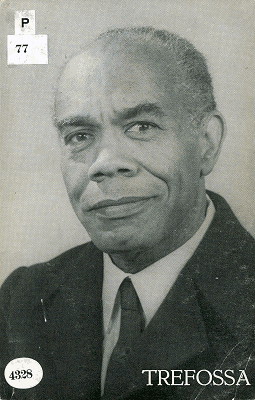Opening sequences from Trefossa: Mi a No Mi (2008), directed by Ida Does
Mi a no mi
solanga mi brudu
fu yu a n'e trubu
na ini den dusun titei fu mi
I am not myself
until my blood
is infused with you
in all of my veins
— From "Gronmama" ("Earthmother"); English translation by Quinton Zondervan
If Suriname has a national poet, Henri Frans de Ziel (1916-1975), who wrote under the pseudonym Trefossa, is perhaps the leading candidate. His groundbreaking 1957 book Trotji, the first published collection of Sranan poems, has been called "the big bang of Surinamese literature." Thousands of Surinamese schoolchildren sing his verse daily — he wrote the Sranan part of the national anthem.
Trefossa: Mi a No Mi (2008), a documentary by filmmakers Ida Does and Paul van den Bos, uses interviews, historic film footage, and Trefossa's own words — from his published poems and unpublished diaries — to tell his story, chart his influence on two generations of Surinamese writers, and investigate how the power of his poems helped legitimise Sranan Tongo in both Suriname and the Netherlands.
Portrait of Trefossa courtesy the DBNL
The text of Ala Poewema foe Trefossa ("Collected Poems of Trefossa", 1977) is available online at the Digitale Bibliotheek voor de Nederlandse Letteren.
Seen: Trefossa, by Ida Does
Saturday, September 5, 2009
Subscribe to:
Post Comments (Atom)






3 comments:
I saw the documentary at Winternachten festival in The Hague and was very, very impressed. Somebody called the film itself a poem, I fully agree.
Ronald Custerman
Seen it, last year, a day after the terrible and sad airplane crash in the interior of Suriname. When the movie had ended I went outside, thinking about it. Chewing on it. Eddy Wijngaarde was there, who organizes The Back Lot Film Festivals, togetehr with Hennah Draaibaar. He asked me what I thought about the movie and I told him that it surprised me that the movie had failed to bring tears to my eyes. They come so easily, those tears, normally … But I did very much appreciate the rhythm and the balance of the movie. So, we decided too: the movie is like a good poem. Not a tear jerker but food for thought on a deeper level.
At home I opened my Trefossa-book and read ‘moro de’: ‘there’s more’.
Two lines: grantangi f’ di mi buba opo greni / fu m’ si sa’ e brenki in’ mi eigi brudu.
In Dutch: ik zeg er dank voor, dat mijn huid de grendels wegschoof / dat ik kon zien wat schitterde in mijn eigen bloed.
In English: i give thanks for my skin to slide away the bolts / so i could see what was shining in my own blood.
Seen it, last year, a day after the terrible and sad airplane crash in the interior of Suriname. When the movie had ended I went outside, thinking about it. Chewing on it. Eddy Wijngaarde was there, who organizes The Back Lot Film Festivals, togetehr with Hennah Draaibaar. He asked me what I thought about the movie and I told him that it surprised me that the movie had failed to bring tears to my eyes. They come so easily, those tears, normally … But I did very much appreciate the rhythm and the balance of the movie. So, we decided too: the movie is like a good poem. Not a tear jerker but food for thought on a deeper level.
At home I opened my Trefossa-book and read ‘moro de’: ‘there’s more’.
Two lines: grantangi f’ di mi buba opo greni / fu m’ si sa’ e brenki in’ mi eigi brudu.
In Dutch: ik zeg er dank voor, dat mijn huid de grendels wegschoof / dat ik kon zien wat schitterde in mijn eigen bloed.
In English: i give thanks for my skin to slide away the bolts / so i could see what was shining in my own blood.
Post a Comment